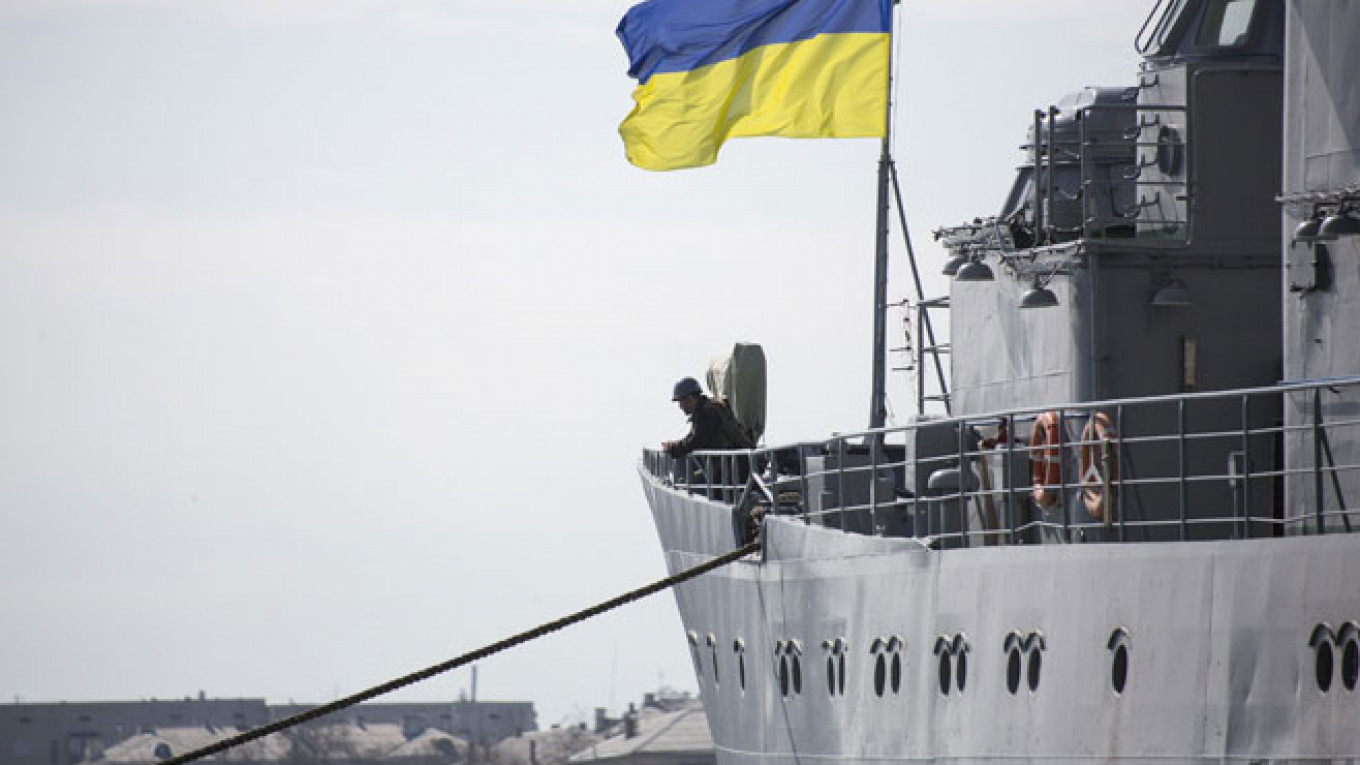KIEV — Ukraine's new pro-Western leadership is not seeking membership in NATO, Prime Minister Arseny Yatsenyuk said Tuesday, in comments intended to reassure Russia and Ukraine's large number of Russian speakers.
Yatsenyuk, who came to office after the removal of Moscow-backed President Viktor Yanukovych, also said that decentralization of power was a key plank of government policy, adding that Kiev's efforts to integrate with Europe would take into account the interests of Ukraine's mainly Russian-speaking industrial east.
"Strictly with a view to maintaining Ukraine's unity, the question of joining NATO is not on the agenda," Yatsenyuk, who normally speaks in Ukrainian, said in a 10-minute televised appeal delivered in Russian. "The country will be defended by a strong, modern Ukrainian army."
Kiev pursued a policy of closer ties with the U.S.-led NATO alliance before Yanukovych took power in 2010. Yanukovych then formally scrapped the idea of Ukraine's eventual membership of NATO, declaring "non-bloc" neutrality for his nation of 46 million sandwiched between Russia and the European Union.
Clashes between protesters and police in which more than 80 people were killed in Kiev, some by police snipers, culminated in Yanukovych fleeing and later being ousted by a parliamentary vote in a move Russia has denounced as illegitimate.
Yatsenyuk also said Ukraine's authorities were determined to disarm all groups holding weapons, regardless of their aims.
"This operation concerns all those holding arms illegally, whatever their slogans," Yatsenyuk said, standing next to a blue and yellow national flag. "There can be no justification for holding arms illegally."
Ministers will extend greater powers to the regions, a key demand in mainly Russian-speaking eastern Ukraine, and a municipal police force will be created, Yatsenyuk said.
"All the new measures linked to decentralization of power will be reflected in a new constitution," he said. "A constitution that we will write together."
Russia, whose forces control Ukraine's Crimea region, says Yanukovych remains the legitimate president and denounces Kiev's new authorities in Kiev as anti-Russian and beholden to extreme right-wing groups who it says forced Yanukovych to quit.
Moscow says it reserves the right to "defend" Russian speakers in eastern and southern regions of Ukraine.
Yatsenyuk said Ukraine would on Friday sign the political part of an association agreement with the 28-nation EU, but would put off agreement on economic issues. It was Yanukovych's decision not to sign the association accord with the EU and to pivot toward Moscow that ignited the street protests in Kiev last November that finally led to his ouster.
"We have postponed for the moment signing the economic part of this document, taking into consideration the concerns and dangers of whether a free-trade zone will have negative effects on industrial regions, primarily the east," he said.
Moving closer to the EU does not preclude Ukraine maintaining good relations with Russia, Yatsenyuk said.
"Despite the catastrophic worsening of relations with Russia, occurring through no fault of our own and despite Russia's armed aggression against Ukraine, I will do everything possible to uphold peace and build relations of partnership and good neighborliness."
A Message from The Moscow Times:
Dear readers,
We are facing unprecedented challenges. Russia's Prosecutor General's Office has designated The Moscow Times as an "undesirable" organization, criminalizing our work and putting our staff at risk of prosecution. This follows our earlier unjust labeling as a "foreign agent."
These actions are direct attempts to silence independent journalism in Russia. The authorities claim our work "discredits the decisions of the Russian leadership." We see things differently: we strive to provide accurate, unbiased reporting on Russia.
We, the journalists of The Moscow Times, refuse to be silenced. But to continue our work, we need your help.
Your support, no matter how small, makes a world of difference. If you can, please support us monthly starting from just $2. It's quick to set up, and every contribution makes a significant impact.
By supporting The Moscow Times, you're defending open, independent journalism in the face of repression. Thank you for standing with us.
Remind me later.






